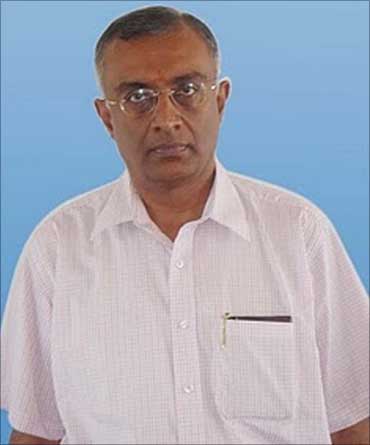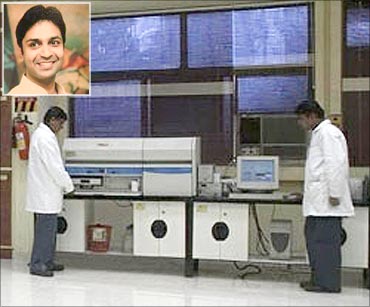
'Need to enhance focus on power transmission and agricultural infrastructure'
S Thiagarajan, CEO, ETL Infrastructure Services (EISL)
Speaking on his expectations form the forthcoming Union Budget 2010-11, S Thiagarajan, CEO, ETL Infrastructure Services (EISL) said, "n the present scenario of a surging Indian economy and a rather nervous international outlook, the Government is probably thinking of reorienting its stimulus package and of containing some of the inflation worries, which is normal in such circumstances.
The Indian economy for several decades has been driven by sentiment and the constant worry about its agricultural economy. It has only come out of this bind recently, and it is necessary to foster this newfound confidence in brand India - that we can believe in ourselves and that agriculture is not the be all and end all of rural markets. In this context, the salutary effects of NREGAare most evident.
The infrastructure sector has been one of the main beneficiaries of the stimulus package, and has shown remarkable resilience in the face of the tremendous pressure from the international banking collapse. While rest of the world has faced a severe shortage of capital, India has seen a surge in fund inflows and a fairly robust investment in infrastructure."
S Thiagarajan has highlighted some of the issues that needs to be addressed in budget as follows:
* High cost of debt to infrastructure which needs to be addressed in some form if Indian infrastructure investment is to become attractive, given its known weakness on the implementation side.
* While there has been tremendous focus on power and on roads, there has been inadequate focus on transmission of power and in the area of agricultural infrastructure like grain storage, warehousing, and most importantly irrigation and water management. These need to be addressed with specific and targeted investment and if necessary through short term subsidies including interest subvention.
* The uncertainty regarding benefits to SEZ needs to be addressed and a finality given to it.
* NREGA has of course addressed the requirements of social security for the rural poor but has also in some form handicapped the farming sector which now finds it impossible to get labour.
NREGA needs to be extended to cover farm labour in the private sector through a coupon system so that in the long run agriculture does not become unviable.
The rural economy in the last 4 years has grown at a rapid pace far ahead of the urban sector but there is a very little focus on providing quality infrastructure in these areas and this needs to be immediately addressed in a intelligent form which may include modifying NREGA to task oriented payment.

Vivek Sood, Chief Financial Officer, Tata AIG Life Insurance Company
Vivek Sood, Chief Financial Officer, Tata AIG Life Insurance Company said, "While there was nothing specific for life insurance industry in Budget 2009, the wish list for Budget 2010 includes suitable amendments in the provisions related to taxation of life insurance companies, which are not amended since 1976, extension of the present limit of 8 years for carry forward of business losses in view of long gestation period involved in life insurance business, additional deduction of Rs. 1.00 lac u/s 80C exclusively for life insurance premium, increase in deduction of Health Insurance Premium u/s 80-D from existing 15,000/- to 30,000/- and the most critical align charges in investments in ULIP to that of mutual funds, where only fund management charges are taxed and there is no tax on entry/exit loads."Budget should give concrete message to Foreign investors
CJ George, Managing Director, Geojit BNP Paribas Financial Services
CJ George wants the Union Budget 2010-11 should send a concrete message to the international investing community on how the country will manage its burgeoning deficit as we are in dire need of large, long term investments into our infrastructure sector. Foreign investors are generally very cautious about country risk these days.

Rajiv Bhalla, Country Head Sales & Marketing, NEC India
Rajiv Bhalla, Country Head Sales & Marketing, NEC India said, "We foresee a progressive budget that assures healthy growth of the economy and greater consideration to the use of technology for the betterment of the society as a whole.
The Budget should pave the way for investment-led growth and stimulate demand through fiscal measures. In the education sector, for instance, we are glad to see that the Government is giving the rightful importance to the basic foundation of education through programmes such as the Sarva Shiksha Abhiyan (SSA).
Also, budgetary allocation towards technology that enables innovation in imparting knowledge and improving the quality of education in the country should be considered.
Similarly, the tourism industry is witnessing recalibrated growth. According to Crisil, In FY09, the market size of the hotel industry was Rs 17,900 crore (Rs 179 billion). At present, 5.5 million tourists visit India and this number is projected to reach 10 million by 2010. It's important that we note that with the growth of a particular industry the infrastructure that supports it should also be strengthened.
In this case to ensure growth of tourism, the hospitality sector needs to be strengthened. The Government's policies and tax structures must be attractive enough to encourage investments in the hotel sector. This in turn will empower hoteliers to look at adopting technology to enhance productivity, ensure customer satisfaction and reduce operational cost.
The IT industry undoubtedly is one of the most significant sectors critical to India's emergence as the next economic superpower.
One also looks forward to budgetary allocations towards some government projects in the space of national security & identity. With national safety gaining predominance in the agenda of the UPA government, we foresee greater allocation in the budget for smarter and more intelligent means of imparting security through some innovative biometric solutions and innovative ID projects."

Eric Braganza, President, Haier Appliances India
Eric Braganza, President, Haier Appliances India said, "Year 2009 was overall good, for sure. However, we expect 2010 continues to be very strong as far as the consumer durables industry is concerned. This is mainly because the 6th Pay Commission benefits are still flowing through.
While we expect this budget to foremost address macro issues, which would impact demand generation, industry also needs administrative & tax reforms in various areas like for movement of goods & double taxation. Hope that in 2010 the government keeps intact sops announced last year to cushion the impact of the global economic downturn.
We also wish tax concessions which we received last year stays through the new year in order to beat the growth rates reached before slowdown hit the economy.
We also hope this year's budget will finally implement GST (Goods and Service Tax). GST can bring about a considerable reduction in the prices of products, which will come as a sign of relief to the common man. This further reduction of prices will come into play owing to the lowering of the multiple level of tax on products and services.
We expect the government to deepen its focus on the rural economy with greater fiscal incentives, rural employment. These steps would surely go a long way in giving the rural economy and rural demand a greater boost.
We expect that policies of the government should be such which would result in higher disposable incomes in the hands of customers so that they loosen up their purse strings and it results in higher sales".

'Provide tax incentives to entrepreneurs to create a military-industrial complex to guard India's security needs'
Harshal Shah, CEO, Reliance Technology VenturesHarshal Shah, CEO, Reliance Technology Ventures has discussed Budget expectations as follows:
1. Fostering deployment of indigenously-built military technology innovations for Indian-owned entrepreneurial companies: the Budget should provide tax incentives to entrepreneurs to create a military-industrial complex to guard India's security needs, to create incentives for Indian-owned or Domestic VC funds-invested entrepreneurial companies to innovate for our defense needs, and to allow such companies to exclusively access some of the technologies developed by Indian military, defence and aerospace agencies.
2. Better clarity on conversion of Trust into LLPs: VC funds are generally set-up as a Trust. The current guidelines are ambiguous with regard to conversion in case of Trusts and may discourage foreign investors, as they may not be able to enjoy tax treaty benefits.
3. Increasing the investment limit for overseas investment: Current guidelines restrict the limit of overseas investment upto 10% of the fund size and limited to overseas companies having some presence in India. Doing away with these restrictions would allow domestic funds to identify, invest and nurture cutting-edge technology innovations globally, which eventually could be deployed for the benefit of emerging countries.
4. Automatic approvals for investments abroad: Given the large amount of FOREX reserves in India, any Indian company should be allowed to invest in companies abroad without any restrictions or approvals upto 400% of its net worth. Also the current annual total cap of $500 million of outbound VC investments should be eliminated.
5. Extending the investments made by FVCI beyond the specified nine sectors: According to the recent FVCI guidelines there is an ambiguity with regard to FVCI funds, wherein they can only invest into the nine designated sectors - biotechnology, nano technology, IT hardware and software, research and development for new chemical entities, seed research, dairy, poultry, bio-fuels and large hotel-cum-convention centers. Secondly pass-through tax benefit is limited to only these sectors.
These restrictions often discourage funds from investing in other sectors even if the opportunity is good. The Ministry should clarify the ambiguity and increase the number of sectors for FVCI investments and also favorably consider the tax implications beyond the nine sectors.

Manish Bang, Director, Expanza Access
Manish Bang, Director, Expanza Access said, "The SMEs are recognized as the most important element in industrial growth and GDP growth of the country. As there are 13 million SMEs in India contributing to 95% of industrial units and producing 45% of the total output. Being small there are many challenges that they face in the business and once they are taken care then they have ability to grow big.
The growth and development of the SME sector is of paramount importance for overall development of the Indian economy, especially to counter the stiff competition from our neighbouring country i.e. China." Manish Bang gas submitted his suggestions to be considered in the coming budget FY10-11 as follows:
* Higher interest rate is always a big issue for SMEs. SMEs are always charged 3-4% higher then what is charged to large corporate by Banks. Few large SME-dedicated banks (Indian or foreign) should be allowed to be established to facilitate greater competition in the SME space. These banks should provide lower Interest rate.
* The government started CGTSME scheme where loan up to 1cr can be given to SME without collateral. The response from the banks is so lukewarm that this scheme is near non-existence. Government must instruct banks to provide a threshold amount under this scheme to SMEs. Also create SME funding as priority sector funding.
* SMEs should be able to easily access risk capital through angel/venture capital and private equity funds. In this regard, SME exchanges/ platforms that which were recently allowed by Sebi can play a crucial role if some fiscal incentives could be provided to mutual funds/FIs to invest a small percentage of their portfolio in SME exchanges. The government should also ask banks to start venture funds for SMEs in order to create risk capital.
* Government must initiate marketing support for SMEs so that exports can be developed by SMEs. Similar to import support agencies like STC and MMTC, the government should start marketing supporting agencies for SMEs.
* SMEs may be allowed tax exemption for the profits ploughed back into the business so as to promote capital investments & hence the growth for the industry.
* It is stated that the excise duty exemption continues to be relevant for many products. Given their small size and informal nature, such enterprises find it too difficult to comply, but are ready to bear the cost burden by not availing set-offs. In view of the rising raw material costs in the last three years, the government may take a sympathetic view on enhancing the exemption limit for excise and service tax. The exemption limit must be increased from Rs.1cr to 3 cr.
* All refunds from the government departments must be priorities for SMEs like refund of excess duty paid, VAT refund, Income Tax refund, TUF subsidy for textile etc. This money can be utilized by SME as working capital to enhance their business.
* Given proper infrastructure and resources Indian SMEs can add big contribution in industrial output and Indian GDP.

Rajiv Agarwal, CEO and Director, The Mobile Store
Commenting on expectations from Union Budget 2010-11, Rajiv Agarwal, CEO and Director, The Mobile Store said, "As the market for Mobile phone, telecom and IT related products has high growth potential in India, we expect the government to align the tax structure for progressive growth that the sector has shown; we would also expect the government to eliminate VAT for the telecom retail sector".
Roadblocks in organized retail
The top most priority for organized retail sector is to get its due recognition as an industry from the Indian government. The major concerns for the sectors are unregulated high rentals, uneven Tax structures (Eg. service tax on rentals) and restriction on FDI in multi brand.
Budget Expectation
We are expecting introducing uniform long term tax structures, and reduction of sales tax and VAT. In the investment front, government should consider attracting foreign direct investment for this sector to accelerate the growth.

Raman Garg, deputy CFO, Max New York Life
Speaking about expectations from Union Budget 2010-11, Raman Garg, deputy CFO, Max New York Life said, "It is important to strike a good balance between growth and inflation while improving consumption.
Directionally the budget should encourage long-term savings behaviour by Instituting separate limit for tax exemption for long-term saving instruments, increasing the limits under section 80 C, tax exemption on annuities and by removing the service tax levied on charges other than Asset Management Charges for ULIPs. Efficient management of fiscal deficit is critical to promote growth of Indian economy."
Raman Garg has discussed core issues, seeking government attention, as follows:
Fiscal consolidation for long-term health of Indian economy
Stimulus packages should continue including assured employment programs, infrastructure programs related to roads, easy access to loans for companies, lesser interest rate on loans.
Implementing GST as early as possible would help the Government benefiting from lesser tax from more number of people leading to higher income and greater compliance.
Increase disposable income in the hands of individuals
Keeping in view high inflation, which has significantly dented disposable income in the hands of individuals, Finance Minister should provide some income tax relief to individuals especially in lower tax bracket so that they could continue investing in long-term savings instruments.
Cess should be abolished to generate more disposable income in the hands of people. This will also help in making the tax structure more simplified.
Promote long-term investment and savings habit
Separate limit for tax exemption for long-term saving instruments like life insurance or increasing the limits under section 80 C and 80D for tax exemption on life and health insurance premium could be one way to promote savings behaviour.
Annuities should be made tax exempt; alternately only the interest on contribution to pension schemes should be taxed (instead of the 1/3rd rule). Increase in exemption limits for gratuity payments to Rs 10 lacs for non-government employees and increase in exemption limit of Employers' contribution to any approved superannuation fund from Rs 1 lac to Rs 5 lacs could be another way to promote savings habit
The government may also evaluate providing tax benefits (including service tax exemption) on promoting insurance and pension products below annual threshold of Rs 1000/- premium/contribution.
Increase exemption limits for gratuity payments to Rs. 10 lacs for non-government employees
Raise exemption limit of Employers' contribution to any approved superannuation fund from Rs.1 lac to Rs. 5 lacs
Specific to life insurance industry
Increased FDI ceiling to 49% can bring in the much-needed capital for the growth of the sector and long-term development. This will also enrich the business by bringing world-class business practices and processes, expand distribution capabilities and deepen market penetration
Service tax should be levied only on Fund Management Charges incase of ULIP products. Charges should be exempt from service tax. Currently this is inequitable with other asset management companies like mutual funds where service tax is charged only on the fund management fees & puts ULIP schemes at a significant competitive disadvantage.
The normal period of eight years for carry forward of losses may not sufficient to absorb the losses of Insurance Business in Private Sector. Therefore, the Government should consider introducing provisions in the forthcoming budget for extending the period of carry forward for life insurance companies from 8 yrs to 15 yrs considering the economic slowdown, shortage in supply of talent and high attrition leading to increase in wages, increasing operating cost due to high inflation and cost of increasing penetration in rural markets.
MAT applicability on Insurance companies at reduced rates based on financials as prepared under IRDA guidelines may also be considered.
ESOP Taxation
As per new perquisite rules, the fair market value (FMV) on date of exercise has to be taken to calculate the perquisite value. This has given rise to a practical difficulty as the difference between the market value and the exercise price is only a notional profit since the employee has not yet sold the shares.
But the employee has to pay tax at the time of exercise of option, which requires cash. This has resulted in the employee needing to sell the shares immediately, just to pay tax, and the entire reason of being allotted stock options to participate in the growth of the company stands defeated.
Our recommendation is that the ESOP benefit should be taxed at the time of actual sale of the shares in the form of capital gains on the excess of sale price over exercise price.